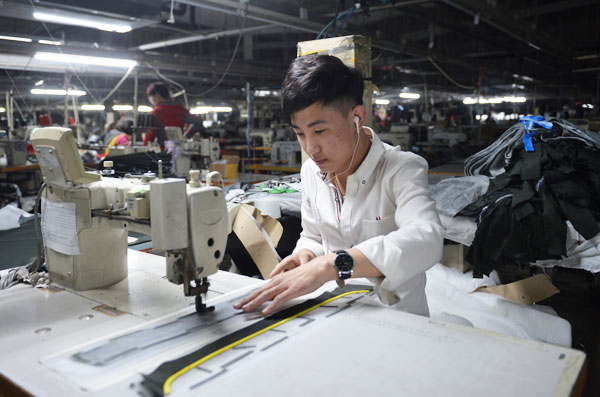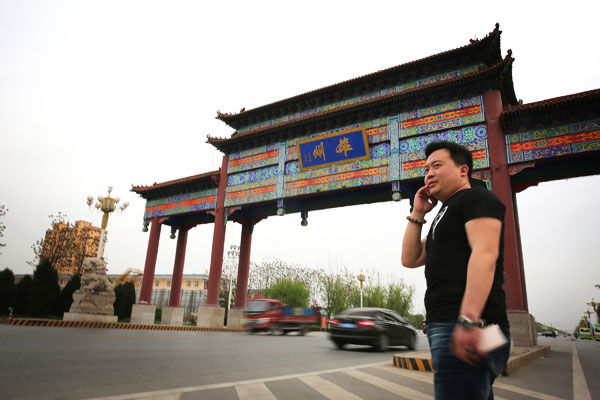After SOEs, private sector makes a beeline for Xiongan
 |
|
A worker at a local clothes manufacturing factory in Rongcheng county is also a pop music lover. [Photo by Leo Chan/For China Daily] |
The proposal to set up the Xiongan New Area is attracting not only State-owned enterprises but the private sector, including startups, entrepreneurs and even fresh graduates from across China.
All are eager to set up a base, perhaps even headquarters, in the upcoming innovation hub.
"Xiongan will be a hot spot for startups and entrepreneurs. It's supposed to drive growth through innovation, technology upgrades and a brand new style of development," said Qu Chunwei, a native of Anxin county, Hebei province, who used to work in Tianjin.
His Xixiangyang village is part of Anxin county, one of the three counties that have been included in the new area, the grand plan for which was announced on April 1.
Qu has just returned to Xiongan to test waters for his own e-commerce business, an online payment app.
The app is expected to aggregate or integrate existing platforms such as WeChat Pay, Alipay, and UnionPay seamlessly. "That way, I can make transactions more convenient, because consumers don't have to download all the e-wallet service apps that different shops demand," he said.
"I think it'll have a huge market as more and more Xiongan residents will choose to pay bills with mobile phones in the future," Qu said.
He said the people of the three counties will become denizens of the Xiongan New Area; thus, all are his potential customers.
Two of Qu's childhood friends from Shanxi province have joined him in the venture. They are receiving training at a startup incubator in Anxin county.
Li Jinkui, deputy bureau chief of the Anxin Employment Service Bureau, said he has received many telephone enquiries from fresh graduates and migrant workers about the support they might receive if they relocate to the area to either set up business or work.
Li said free training would be provided to those starting up. The employment bureau will come out with more supportive policies to encourage people to start innovation-related businesses in future.
"We used to ask them (natives settled elsewhere) to return, but we were always rebuffed because they thought the small town didn't offer good opportunities," Li said.
Thanks to the Xiongan New Area plan, the situation has changed now.
 |
|
A fisherman from Anxin county tries to catch fish at the lake of Baiyangdian with help from cormorants. [Photo by Leo Chan/For China Daily] |
The new area, the third national special economic zone after the Shenzhen Special Economic Zone and the Shanghai Pudong New Area, is of national significance and "crucial for the millennium to come", according to the central government.
"I believe the new area will bring a lot of opportunities that would be comparable to that of neighboring Beijing and Tianjin," said Yang Hejun, head of Anxin Mingdao Start-ups Service Co Ltd, a startup incubator.
The enterprise has enrolled about 20 candidates, including returnees and locals, for training in starting a new business.
Mingdao was established last year to help develop new businesses by giving them office space and related services, including advice on business and technology. It has set up 70 offices for use by startups.
Given the high chance for a rise in the number of innovative startups now, supportive policies could lead to the incubator's expansion, Yang said.
Not many Anxin natives working outside appear to have returned to their hometown like Qu had done in less than two weeks after the big announcement on April 1, he said. "But I've heard that many successful entrepreneurs in big cities like Beijing are planning to return."
Niu Gensheng, 64, a native of Rongcheng county, one of the three countries included in the Xiongan New Area, told Hebei Daily that he had advised his son, who works in Beijing, to return home in the near future.
According to Yang, most of the locals now based elsewhere are waiting for further clarity on policies and development plans for the new area. Such policies and plans are being drafted.
Yang said all those keen to set up startups, including himself, should be prudent, and choose only those business fields that are in accordance with the policies of the planned new area.
Xinhua News Agency quoted Chinese Vice-Premier Zhang Gaoli as saying that Xiongan should promote innovation, attract high-tech enterprises and avoid becoming an industrial hub led by traditional industries.
The proposed emphasis appears to have inspired some of the established local entrepreneurs to adapt their development strategies accordingly.
Xu Linghua, chairman of Hebei Taidou Cable Group Co Ltd, said he has started combining his old business with innovation. Taidou Cable is a local private company engaged in the making of cables in Xiongxian, the third county included in the new area.
"My cable-making factories might adapt to the overall planning of the new area," Xu said, adding that he is keen to establish an online platform to exhibit and sell cable products across China.
"Even if my factories get eliminated (as part of the area development), internet-led businesses might be welcome, because cables will be still needed in the development of Xiongan," he said. "They will be needed in buildings and transportation facilities such as subway train systems," Xu said.
 |
|
Zhang Peng, a native of Xiongxian county, is an investor in the county's ecological agriculture. He returned from Baoding where he finished his schooling and started his career. [Photo by Wang Weiqian/For China Daily] |
A Xinhua report quoted an official with the preparatory committee of Xiongan as saying that high-tech businesses such as 5G communications, biomedicine, artificial intelligence and internet finance might be welcome.
The master plan for the new area development has not yet been finalized.
Companies such as Hebei Hengshan Construction Co Ltd, which is based in the provincial capital Shijiazhuang, about 200 km away from Xiongan, are watching the situation closely.
Xing Shitian, who works with Hengshan, believes no matter how the area will develop, new infrastructure such as buildings is essential. Hengshan may well set up a branch in the area, he said.
"I hope specific policies for the development of Xiongan will be announced as soon as possible. We are well prepared to go there and seek new construction orders," Xing said.
While the private sector and individual entrepreneurs are awaiting policy clarity, State-owned enterprises have received initial support from policymakers.
The State-owned Assets Supervision and Administration Commission of the State Council said on April 14 that central SOEs will be encouraged to locate their newly registered high-tech, new technology and high-end service businesses in the Xiongan New Area.
They "are encouraged to lend strong support to the construction of the zone in areas like energy security, infrastructure, electricity, telecommunications, rail transport, ecological protection, information-based networks and smart cities," it said in a statement.
Contact the writers at zhangyu1@chinadaily.com.cn





















